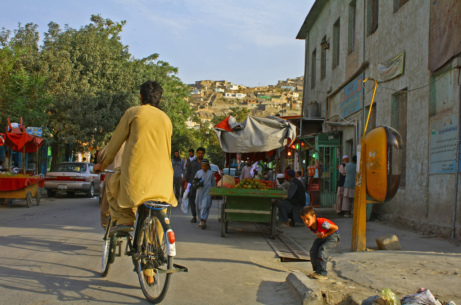
Gates Cambridge alumna Simone Haysom has co-edited a journal article on urban displacement. The publication coincides with a report she co-authored on displacement in Kabul for the Overseas Development Institute.
The humanitarian sector has failed to act on the issue of urban displacement and has struggled to employ existing knowledge and to adapt practice, according to a new report co-edited by a Gates alumna.
The report, Urban vulnerability and displacement: a review of current issues, is published in a special edition of the peer-reviewed journal Disasters this month. Simone Haysom [2009] is lead co-editor. She is currently a research officer at the Overseas Development Institute in the UK.
The report presents an overview of the historical development of debates on urban displacement since the 1970s and assesses the ramifications of urban vulnerability for humanitarian practitioners.
Simone is also editor of a working paper on Kabul, published by the ODI this month. Sanctuary in the city? Urban displacement and vulnerability in Kabul explores the phenomenon of displacement in the urban environment and the implications and challenges it poses for humanitarian action in Kabul.
It is part of a series of studies on urban displacement, which includes case studies on Damascus and Amman, also co-authored by Simone.
The findings of the Kabul study showthat the vast majority of Kabul’s urban poor have been displaced at one time or another during their lifetime. They also indicate that the drivers of vulnerability amongst Kabul’s urban poor, including displaced populations, are complex and relate to a wide range of social, political, ethnic, cultural and other factors.
In a related blog posted on the Overseas Development Institute website this week Simone argues that donors and agencies need to support the solutions that provide the most security and opportunity for the displaced people from rural areas of Afghanistan who are flocking to Kabul. Government policies of encouraging them to return to places where they don’t feel safe will not work, she says, and their numbers in Kabul are likely to grow due to the deteriorating security conditions in the country.
She writes: “Rather than encouraging their return (to rural areas in particular), donors and agencies should support the solutions that provide the most security and opportunity for the displaced. These solutions can be found in urban areas – not least because the displaced have already decided that their security is best provided there.”
Simone’s recent work has also included an in-depth desk review of trends in humanitarian civil-military coordination. She is currently working on a report on displacement in the Gaza strip.
Picture credit: marman2009 and Creative Commons.












